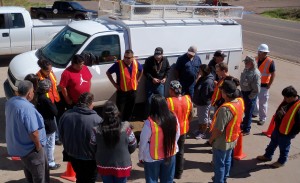 Before enrolling in a degree program, many students look at the type of state jobs available with an emergency management degree. They either want to use their degrees to work for the state where they attended school or in their home states. The devastating aftermath of Hurricane Katrina and later Hurricane Sandy showed that states could benefit from having emergency management specialists on staff. With a degree in the subject, students can work in several positions in many states.
Before enrolling in a degree program, many students look at the type of state jobs available with an emergency management degree. They either want to use their degrees to work for the state where they attended school or in their home states. The devastating aftermath of Hurricane Katrina and later Hurricane Sandy showed that states could benefit from having emergency management specialists on staff. With a degree in the subject, students can work in several positions in many states.
Emergency Response Specialist
The moment that an emergency occurs is the moment that specialists spring into action. Some of the state jobs available with an emergency management degree include emergency response specialists. As a specialist, you have the chance to help those in need in the hours, days, weeks and even months following a fire or some type of natural disaster. They coordinate volunteers, work with national organizations and local groups, find effective ways to handle situations that arise as a result of that emergency and handle many other tasks. Those with military, firefighting or police experience do best in these roles.
Emergency Management Specialist
An emergency management specialist is similar to a response specialist, but the main difference relates to when those individuals go to work. Response specialists only work immediately after an emergency occurs. Management specialists work prior to a situation occurring. They are the ones who look for potential problems and find ways to solve that problem before it occurs. They might look at what to do after an earthquake hits a larger city or what to do when a tornado strikes a small town. Management specialists often work with national organizations to coordinate potential relief efforts that might occur.
State Trainer
The types of state jobs available with an emergency management degree may include positions as state trainers as well. A trainer is someone who travels across the state and works with organizations and governments at the local level. They talk with those working for the government about the potential problems that might arise and help them understand that they need to know what to do in the future. A trainer will often run drills and exercises to ensure that groups know what to do. These drills often take place on the weekends and force workers to coordinate with others and make split-second decisions in the same way they would during a real disaster.
Management Directors
According to the Bureau of Labor Statistics, the need for management directors will increase by approximately eight percent between 2012 and 2022. The BLS also puts the median wage for directors at nearly $60,000 a year. Unlike other state jobs, directors find themselves involved in emergency response both before and after an incident occurs. They coordinate with others to look at potential disasters and ensure that local and state agencies can handle what occurs next, but they also work after a disaster to help the cities and towns affected by those disasters receive the necessary help and support.
Related Resource: Border Patrol Agent
Emergency situations can take the form of a hurricane, earthquake, wildfire or dozens of other problems. Those working in the field at the state level cities and individuals recover after one of these incidents. Find out more about the state jobs available with an emergency management degree before you decide to enroll in one of these college programs.